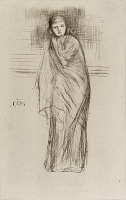Draped Model | ||
| Number: | 109 | |
| Date: | 1873/1874 | |
| Medium: | drypoint | |
| Size: | 210 x 135 mm | |
| Signed: | butterfly at left (4-final) | |
| Inscribed: | no | |
| Set/Publication: | 'Cancelled Plates', 1879 | |
| No. of States: | 11 | |
| Known impressions: | 35 | |
| Catalogues: | K.100; M.118; T.80; W.87 | |
| Impressions taken from this plate (35) | ||
TECHNIQUE
The model is lightly drawn in drypoint.
PRINTING
A surprising number of impressions of the drypoint before cancellation have been located, possibly out of an edition of 25, for two of the surviving impressions - of the sixth and seventh states - bear cryptic codes as follows:
'1. Of 25. X' ( the 'x' is in a different lead), on .
'5. '(o* 25 -)' on );
'5. '(o* 25 -)' on );
Most impressions are in black ink though a few late impressions (of the sixth to tenth states) appear grey (, , ).
An impression marked '1st state -' is on buff laid paper (), a second state is on cream Asian laid (), and a third on dark ivory watermarked laid paper (). Impressions of the fourth state are on off-white paper taken from a book (), and cream laid paper watermarked 'B. TH' in a circular cartouche (), and the fifth is on ivory laid paper ()
Several impressions of the sixth state have been located, and single impressions of the next four states. Papers used for the sixth state include a sheet from a book with a 'V' countermark and an old inscription (), and another on ivory laid paper with a waternark, possibly the Basel crozier (). Two sheets of ivory laid paper with the Arms of Amsterdam watermark are from a book: a sixth state bears a Greek text referring to the Acts of the Apostles () and a seventh has an old Dutch inscription on the verso (). Later impressions are on laid papers including medium-weight ivory () and buff 'antique' (pre-1800) paper ().
Impressions from the lightly cancelled plate were published in an album of Cancelled Plates ('Cancelled Set') by The Fine Art Society, London, 1879, possibly in an edition of 20. They are in black ink on a variety of papers, mostly laid, including a cream 'modern' laid paper with a Strasbourg Lily/WGL watermark ().
In addition there are at least four impressions of the drypoint with addition work, after cancellation and restoration. One is in black ink on wove paper, possibly Asian () and another on cream Japanese paper (). It is not clear who was responsible for the 'restoration' of the plate, which obviously dates from after publication in 1879.
